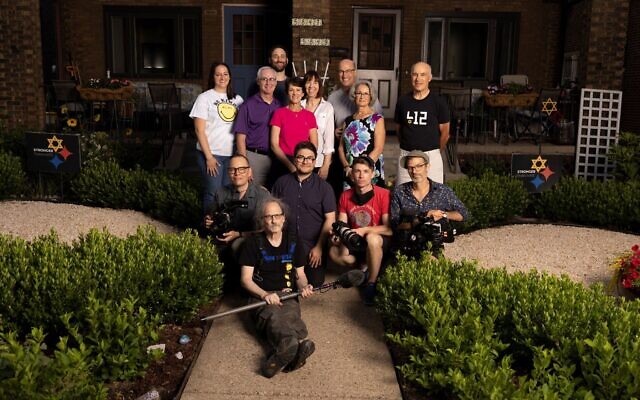This article was first published at The Pittsburgh Jewish Chronicle. Read the entire article at their website.
 |
|
The Mallinger and Wedner families with the "Not In Our Town" film crew. Photo provided by Patrice O'Neill
|
Patrice O’Neill — a documentarian working on a film about the Oct. 27 shooting in Pittsburgh — knows the value of a story.
In 1995, when O’Neill heard about Billings, Montana, a town that, “stood up against hate crimes,” she decided to tell that community’s story in a half-hour film that eventually became the first in the PBS series “Not in Our Town.”
The program, O’Neill said, tells a very straightforward tale about what people did when white supremacists started organizing in their town, overturning headstones in a Jewish cemetery and leaving racist fliers on cars after a Martin Luther King, Jr. rally. The town had had enough.
When skinheads began making appearances at a small Black church in the town, attempting to intimidate the congregation, other congregations and community members rose up in solidarity. Members of a painters’ union repainted a Native American woman’s house that was plastered with racist graffiti messages, and 100 neighbors came out to show their support. When a brick was thrown through a Jewish boy’s window in which a menorah had been displayed, residents of the town placed paper menorahs in their own windows in support of their Jewish neighbor.
The white supremacists stopped organizing.
After the documentary aired, O’Neill got a call from a group in Bloomington, Illinois, who, hearing about Black churches that were burnt in the South, wanted to act to make sure that didn’t happen in their community.
“We decided to follow them, and we’ve been doing that ever since,” O’Neill told the Chronicle. “Twenty-five years we’ve been following the story — not the story of hate, but the story of what we can do about it.”
For the last three years, O’Neill has been working on what she called the most difficult film of her entire life: “Repairing the World: Stories from the Tree of Life.”
“It’s so complex,” she said. “I think the stakes are so high. It’s been a very challenging story.”
Part of the challenge for O’Neill is that she has chosen to tell the story through the voices of more than 120 community members.
“Our stories are told by a chorus of characters, and for that chorus to sing together beautifully, that is something you have to think about every frame,” she said.
Read more at the The Pittsburgh Jewish Chronicle »
Add new comment